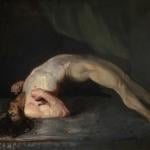At a recent conference organised by the Australian Society for Continental Philosophy, delegates would have been introduced to strands of Play Theory, elements of which would have been interesting and theologically nurturing.
One such theorist, the Hungarian-American psychologist Mihaly Csikszentmihalyi, wrote in 1981 that play is more than just the generation of self-centred pleasure for those engaged in play. Whether it would be in the context of a game, dance or theatrical performance, play can be responsible for extending reality beyond the horizons within which that act of play is taking place. Writing in another context, Richard Schechner wrote in 1990 of “performance” as being responsible for enlargening a culture. A more thorough overview of Play Theory’s relation to culture can be found in Patricia Masters’ article in Sociology Compass entitled “Play Theory, Playing and Culture“. In a post that similarly suggests the cultural valence of play, the Social Learning Blog has put up a post looking at the role of gaming in social transformation.
While the above post might at first glance attribute a crass frivolity to the liturgy (and indeed to play), these strands of Play Theory are interesting for they can give us new insight into what is taking place in our liturgies. It may seem at first glance somewhat banal to call something so solemn and sacramental a game. However, one cannot ignore the valence of Play Theory in articulating the task of Liturgy, particularly in the Eucharist. In the Liturgy, God enters history, and in so doing “advances the peace and salvation of all the world”. Our world of pride, emnity and violence becomes the dining hall for a party that quite literally ends all parties – namely the Wedding Supper of the Lamb. What is that if it is not, as Luke Bretherton describes it, envisioning a different future, if only for a moment, “and having reality re-framed”? In other words, what the Eucharist is is not only the entry of the Body of Christ in our broken world, but extending and envisioning an alternative to that broken world, to borrow Csikszentmihalyi’s words.
At another level, because the Eucharist is supposed to bring us ever closer to the beatific vision, which is characterised by an eternal reveling in the presence of God, it is thus proper to consider the Liturgy’s relationship to Play Theory. One is not so much reducing the Liturgy to a form of entertainment, but is providing the blueprint of true play (and thus calling into question whether entertainment can be true play), by which all other forms of play in contemporary culture can be judged. It can also be the means by which the Christian can critique society’s relationship to play, in particular in entertainment societies where a narrow vision of play is now seen to be the highest good, but producing instead only counterfeit forms of enjoyment.











